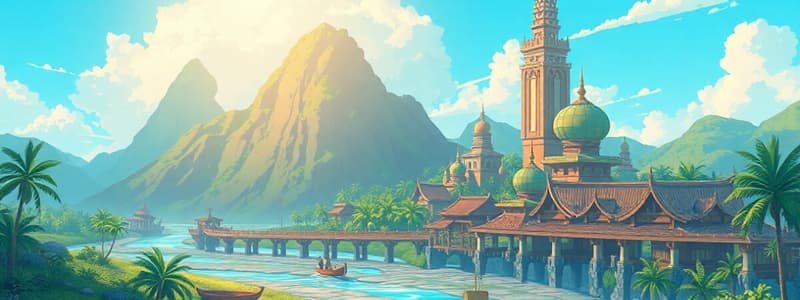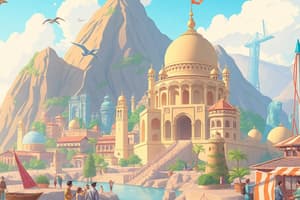Podcast
Questions and Answers
What was the primary purpose of the Grand Tour undertaken by young European aristocrats?
What was the primary purpose of the Grand Tour undertaken by young European aristocrats?
- To explore new trade routes
- To expand political relations
- To participate in scientific research
- To gain educational experiences (correct)
Which significant event occurred during the 18th to 19th century that greatly influenced travel?
Which significant event occurred during the 18th to 19th century that greatly influenced travel?
- The establishment of airlines
- The creation of national parks
- The development of steamships
- The Industrial Revolution (correct)
Who is credited with founding the first travel agency in 1841?
Who is credited with founding the first travel agency in 1841?
- John Smith
- Thomas Edison
- Henry Ford
- Thomas Cook (correct)
In which centuries did the Grand Tour primarily take place?
In which centuries did the Grand Tour primarily take place?
What aspect of society did the Grand Tour primarily aim to educate young aristocrats about?
What aspect of society did the Grand Tour primarily aim to educate young aristocrats about?
Which area focuses on adapting to unexpected challenges in the tourism business?
Which area focuses on adapting to unexpected challenges in the tourism business?
What is a key factor in enhancing the appeal of tourism products in a competitive market?
What is a key factor in enhancing the appeal of tourism products in a competitive market?
Which component is primarily concerned with building and enhancing an organization's public perception?
Which component is primarily concerned with building and enhancing an organization's public perception?
Which aspect of tourism business development involves preparation for future disruptions?
Which aspect of tourism business development involves preparation for future disruptions?
Which of the following areas is most likely to require ongoing skills enhancement in tourism?
Which of the following areas is most likely to require ongoing skills enhancement in tourism?
What is the primary reason for the wider celebration of Día de los Muertos in Mexico?
What is the primary reason for the wider celebration of Día de los Muertos in Mexico?
Which festival is most closely associated with the traditions mentioned in the content?
Which festival is most closely associated with the traditions mentioned in the content?
How do tourists influence local traditions associated with Día de los Muertos?
How do tourists influence local traditions associated with Día de los Muertos?
What aspect of Día de los Muertos traditions are tourists particularly interested in?
What aspect of Día de los Muertos traditions are tourists particularly interested in?
What is one way in which tourism impacts Día de los Muertos in Mexico?
What is one way in which tourism impacts Día de los Muertos in Mexico?
What characterizes tourism demand according to the content?
What characterizes tourism demand according to the content?
Which of the following statements is true regarding the impact of air travel on the environment?
Which of the following statements is true regarding the impact of air travel on the environment?
Which group is described as 'tourists and potential tourists'?
Which group is described as 'tourists and potential tourists'?
What is a key factor influencing tourism demand?
What is a key factor influencing tourism demand?
Which of these would NOT typically be considered a part of tourism demand analysis?
Which of these would NOT typically be considered a part of tourism demand analysis?
What is a primary reason air transportation is essential for tourism?
What is a primary reason air transportation is essential for tourism?
How does air travel impact the number of people who travel?
How does air travel impact the number of people who travel?
What characteristic of air transportation makes it particularly beneficial for tourism?
What characteristic of air transportation makes it particularly beneficial for tourism?
Which of the following best describes the role of air transportation in the tourism sector?
Which of the following best describes the role of air transportation in the tourism sector?
In what way has air transportation influenced tourism compared to other forms of travel?
In what way has air transportation influenced tourism compared to other forms of travel?
What is an indirect way that a tourist spending money in Paris benefits the local economy?
What is an indirect way that a tourist spending money in Paris benefits the local economy?
Why is the baker's income considered generated indirectly through the tourist's spending?
Why is the baker's income considered generated indirectly through the tourist's spending?
What role does the hotel play in the economic interaction described?
What role does the hotel play in the economic interaction described?
How does the example illustrate the concept of economic interdependence within a community?
How does the example illustrate the concept of economic interdependence within a community?
What could be a potential consequence of decreased tourism in Paris for local businesses?
What could be a potential consequence of decreased tourism in Paris for local businesses?
Flashcards
Indirect Income
Indirect Income
Income generated by one business through the spending of another business, even if they don't directly interact.
Tourism Spending Impact
Tourism Spending Impact
The effect of tourist spending on local businesses, including those not directly visited by tourists.
Economic Linkages
Economic Linkages
The connections between different businesses in an economy, where one's spending supports another.
Multiplier Effect
Multiplier Effect
Signup and view all the flashcards
Local Business Support
Local Business Support
Signup and view all the flashcards
Grand Tour
Grand Tour
Signup and view all the flashcards
Industrial Revolution
Industrial Revolution
Signup and view all the flashcards
Technological Advances
Technological Advances
Signup and view all the flashcards
Thomas Cook
Thomas Cook
Signup and view all the flashcards
First Travel Agency
First Travel Agency
Signup and view all the flashcards
Día de los Muertos
Día de los Muertos
Signup and view all the flashcards
Preserved Traditions
Preserved Traditions
Signup and view all the flashcards
Tourist Interest
Tourist Interest
Signup and view all the flashcards
Festivals
Festivals
Signup and view all the flashcards
Related Art
Related Art
Signup and view all the flashcards
Transportation's Role in Tourism
Transportation's Role in Tourism
Signup and view all the flashcards
Air Travel: Key to Accessibility
Air Travel: Key to Accessibility
Signup and view all the flashcards
Why is air travel important?
Why is air travel important?
Signup and view all the flashcards
Tourism Demand
Tourism Demand
Signup and view all the flashcards
Tourism Impact
Tourism Impact
Signup and view all the flashcards
CO2 Emissions from Travel
CO2 Emissions from Travel
Signup and view all the flashcards
Analyzing Tourism Demand
Analyzing Tourism Demand
Signup and view all the flashcards
Potential Tourists
Potential Tourists
Signup and view all the flashcards
Digitalization in Tourism
Digitalization in Tourism
Signup and view all the flashcards
Tourism Innovation
Tourism Innovation
Signup and view all the flashcards
Tourism Crisis Management
Tourism Crisis Management
Signup and view all the flashcards
Training in Tourism
Training in Tourism
Signup and view all the flashcards
Tourism Brand Creation
Tourism Brand Creation
Signup and view all the flashcards
Study Notes
Definitions
- Tourism is a multifaceted phenomenon encompassing social, cultural, and economic aspects of people traveling outside their usual environment.
- Tourist Demand refers to the total number of people traveling or wanting to travel, utilizing facilities away from their typical work and residence.
- Real Tourists are those who desire and can travel, whilst Potential Tourists have a desire but lack the ability to travel.
- Deferred Demand describes individuals capable but unwilling to travel.
- Online Travel Agency (OTA) is a platform facilitating travel bookings.
- Destination Management Company (DMC) is a company handling various aspects of destination management.
- Meetings, Incentives, Conferences, and Exhibitions (MICE) is a category of tourism focusing on those activities.
Evolution of Tourism
- Classical and Medieval Times: Travel primarily for religious, military, commercial, adventurous, or explorative purposes.
- 14th-16th Century: Commercial routes and infrastructure led to improved transportation and rising incomes, boosting mass tourism.
- 17th-19th Century: The Grand Tour emerged as a traditional educational journey for young European aristocrats.
- 18th-19th Century: Industrial revolution and technology advancements shaped the sector.
- 1841: Thomas Cook established the first travel agency, pioneering organized tours.
- 1919: First commercial flight from London to Paris.
- 1996: Expedia Foundation as a Microsoft division arose.
- 1997: Air transport liberalization in Europe.
- 2007: Airbnb was founded.
- 2020: COVID-19 pandemic impacted travel significantly.
Key Points Enabling Tourism
- Trains, planes, and improved roads and cars facilitated broader travel access.
Tourism Impacts
Economic Impacts
- Positive: Job creation, income generation, and positive balance of payment contributions.
- Negative: Price inflation, an insecure job market, infrastructure costs, and overdependence on tourism.
Social Impacts
- Positive: Intercultural contact, revitalization of identity symbols, preservation of traditional lifestyles.
- Negative: Crowded spaces, erosion of relationships, and an increase in crime rates.
Cultural Impacts
- Positive: Intercultural contact, preservation of traditional lifestyles, and revitalization of identity symbols, and raising awareness of various cultures.
- Negative: Crowded spaces and erosion in social relationships.
Environmental Impacts
- Positive: Conservation and restoration of natural and cultural environments, and financial support, and tourism encourages the preservation of heritage.
- Negative: Pollution, waste generation, habitat destruction, water consumption, and impacts on landscapes, contributing to increased emissions.
Elements to Analyze Tourist Demand
- Tourist profile (generation, nationality), income and spending patterns, type of stay, motivations, and satisfaction.
DMO (Destination Management Organization)
- National, regional, or local organizations responsible for managing and marketing destinations.
- Functions include strategic planning, market intelligence, destination policy formulation, product and tourism business development, digitalization, crisis management, training, promotion, marketing, brand creation, investment financing, and promotion activities.
Companies in the Tourism Sector
- Includes transportation, food and beverage, leisure, guiding, and intermediaries.
TTOO (Tour Operators) vs. Retailers
- TTOO create and distribute tourist products, generally not selling directly but working through retailers.
- Retailers distribute products created by TTOOs and can also create their own for direct sale.
Importance of Transportation
- Connects tourism activity with destinations, and its availability plays a substantial role in how far a tourist can travel. This significantly impacts the experience provided.
Elements of Tourism Promotion
- Essential tool for promoting services/products to attract tourists, aims to increase awareness of destination services, products, or attractions, thereby influencing tourist behavior.
Tourist Information Services and Promotion
- Facilitate informative support to travelers, before, during, and after their trips.
Studying That Suits You
Use AI to generate personalized quizzes and flashcards to suit your learning preferences.




